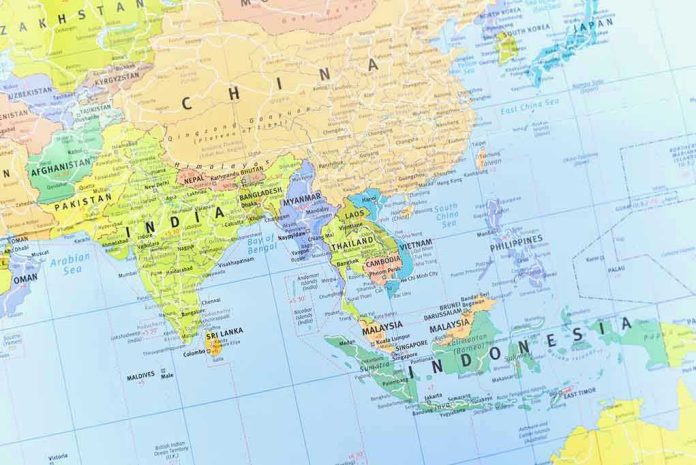
President Trump just drew a red line in the sand for Cambodia and Thailand: no ceasefire, no further U.S. trade talks—reminding the world what decisive American leadership looks like after years of feckless, confused foreign policy from the left.
At a Glance
- Trump demands immediate ceasefire from Cambodia and Thailand as a precondition for U.S. trade negotiations
- Ceasefire ultimatum comes amid Trump’s broader push to expand historic Abraham Accords and restore U.S. global leverage
- Diplomatic efforts follow years of failed peace attempts and chaos in the Middle East under the prior administration
- Trump’s direct approach signals a return to America-first diplomacy and the end of “leading from behind”
Trump’s Ceasefire Ultimatum to Cambodia and Thailand: No Nonsense, No More Games
President Donald Trump, fresh off a round of high-stakes Middle East diplomacy, is sending a message to Southeast Asia that echoes what American voters demanded in 2024: enough chaos, enough weakness, enough endless negotiation. Trump made it clear on Friday that Cambodia and Thailand will see no new U.S. trade agreements until they lay down their arms and restore calm along their disputed border. It’s a move that would have been unthinkable under the Biden administration, where every rogue regime got a free pass and American interests were always an afterthought. But Trump’s America knows that peace comes from strength, not apology tours.
Dealmaker: President Donald Trump Tells Cambodia, Thailand They Must Cease Fire Before More Trade Talkshttps://t.co/ma9YGlX0As
— RedState (@RedState) July 26, 2025
This isn’t just about two countries halfway around the world. Trump’s stance is a shot across the bow for every tinpot dictator and global troublemaker who got used to the U.S. playing the world’s doormat. By tying American trade to real-world results instead of empty promises, Trump restores something that’s been missing for years: accountability. No more endless “diplomatic engagement” while our trading partners undermine global stability and thumb their noses at us. That era is over.
Peace Through Strength: How Trump’s Middle East Legacy Shapes New Diplomacy
Trump’s demand for a ceasefire in Southeast Asia is no isolated event. It’s the logical next step from his Abraham Accords, the 2020 breakthrough that normalized relations between Israel and several Arab states after generations of conflict. The left said it couldn’t be done. The world’s “experts” sneered. But Trump got it done, and now he’s leveraging that same dealmaker instinct to push for broader regional peace—including in places the prior administration left in smoldering ruins. With the Gaza conflict still festering, Trump has made it clear: no more U.S.-brokered deals until the killing stops and the region’s bad actors start acting like adults. For decades, American foreign policy was a clown car of bureaucrats who cared more about process than results. Trump is different. He understands that only a clear line—backed by the world’s most powerful economy—will move dictators to the table.
Trump’s team points to the recent collapse of Gaza ceasefire talks as proof that the old “engagement” approach is dead. Hamas, ever the spoiler, rejected proposals and forced both U.S. and Israeli negotiators out of Qatar. Instead of making excuses, Trump’s administration is doubling down: no deals, no relief, no normalization until real, verifiable peace is on the table. That’s how grownups negotiate. That’s the way you protect American interests—and the safety of our allies—without endless wars or caving to international bullies.
Restoring America’s Leverage: No More Free Rides for Global Troublemakers
For years, Americans watched as our government handed out trade deals, foreign aid, and diplomatic recognition to countries that gave us nothing in return—or worse, actively worked against us. The average taxpayer footed the bill while our leaders played nice with regimes that laughed behind our backs. Trump’s ceasefire ultimatum to Cambodia and Thailand is a return to common sense. You want access to the world’s greatest market? Prove you can keep the peace. You want American investment and partnership? Show you deserve it. That’s not “isolationism.” That’s basic self-respect. The United States is not a charity for foreign governments who can’t control their own borders or refuse to stop shooting at each other.
The ripple effects are already being felt. Regional powerbrokers are scrambling to avoid being left out of Trump’s new regional order—a world where America sets the terms, not the other way around. Even U.S. businesses, long frustrated by the instability overseas and the constant threat of government overreach at home, are welcoming the change. After years of being told America’s best days were behind us, Trump is reminding everyone: when you put the interests of your own citizens first, the world takes notice.
What’s Next: The Left’s Failed “Engagement” Versus Trump’s Results-Driven Diplomacy
Critics in the Beltway and the media predictably howl that Trump’s approach is “reckless.” But after years of watching American prestige nosedive under the last administration—thanks to “woke” priorities, endless apologies, and border chaos—most Americans know better. Trump’s ceasefire ultimatum is a reminder that real diplomacy means drawing lines and sticking to them. The failed approach of endless engagement, leading from behind, and coddling foreign misbehavior is done. Trump’s America doesn’t subsidize dysfunction. It demands results. And if the so-called experts don’t like it, maybe they should ask the families who suffered under years of chaos and runaway inflation whether they’re ready for another round of “business as usual” from Washington. Spoiler alert: they’re not.
Trump’s message to Cambodia and Thailand—and the rest of the world—is loud and clear: America is back in charge. The era of trade without accountability, peace deals without peace, and foreign chaos subsidized by the American taxpayer is over. And for once, that’s a foreign policy we can all get behind.







